Level Up Your Learning: Exploring the Top 10 Online Platforms in 2025
The online learning world has grown tremendously, offering Shopify store owners and creative entrepreneurs countless opportunities to improve skills and expand businesses. All this can be achieved from the convenience of your workspace. Running a business, especially in the fast-paced online market, can be demanding, leaving little time for traditional learning.
This is where the advantage of online learning platforms comes into play. These platforms address time constraints and accessibility by providing flexible, on-demand learning tailored to diverse needs and budgets. However, with the sheer number of available options, choosing the right platform can be daunting.
Selecting the ideal online learning platform depends on several key factors. What are your learning objectives? Are you looking for comprehensive professional development courses, quick tutorials for specific software like Figma, or inspiring workshops to boost your creativity?
Pricing structures also differ, ranging from free resources to subscription models and one-time purchases. Consider the platform's user interface and technical requirements. A seamless and intuitive experience is essential for effective learning. The quality of instruction and the platform's reputation are also vital for ensuring you receive valuable, credible education.
This curated list of the top 10 online learning platforms for 2025 will help you navigate the options and make an informed decision. We'll examine a variety of platforms catering to different learning styles, budgets, and technical skills. Topics covered include everything from business management and marketing strategies to design principles and creative software tutorials.
Finding the Right Fit for You
Whether you're aiming to enhance your Shopify marketing, learn new design software like Adobe Photoshop, or explore the latest e-commerce trends, this guide will help you find the perfect platform. We'll explore platforms that offer:
- Business Management Courses: Gain insights into effective strategies for scaling your business.
- Marketing Strategies: Learn techniques to boost your brand visibility and drive sales.
- Design Principles: Master the fundamentals of design to create visually appealing content.
- Software Tutorials: Develop proficiency in essential tools for your creative endeavors.
This exploration will help you upgrade your learning and unlock your full potential. Let's dive in!
1. Tevello
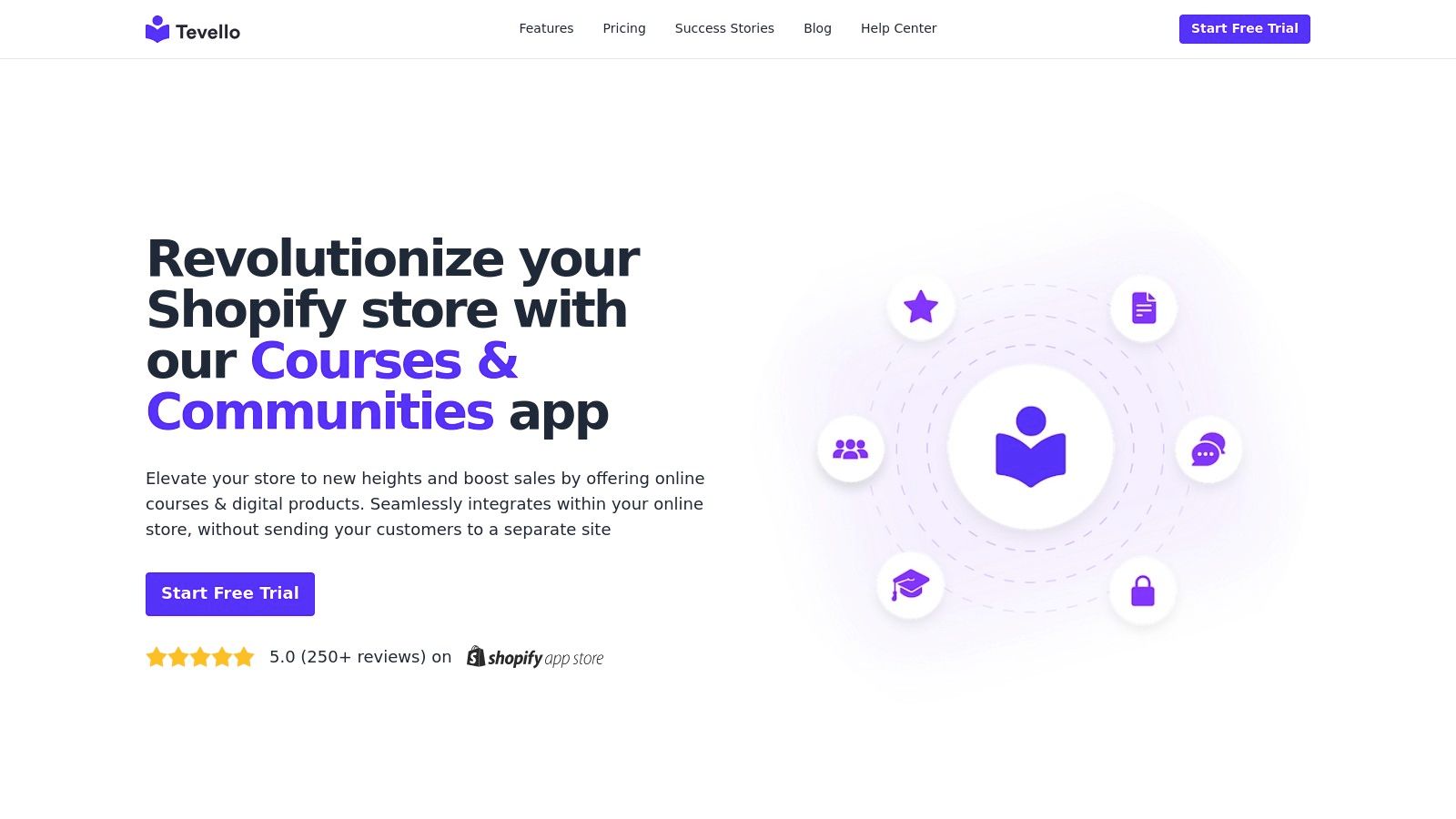
Tevello is a robust all-in-one learning management system (LMS) built specifically for Shopify store owners. It seamlessly integrates digital courses and community features directly within your Shopify store, eliminating the need for external platforms and confusing redirects. This makes it a fantastic option for entrepreneurs looking to broaden their product offerings and cultivate deeper customer engagement.
Imagine a potter selling ceramic supplies on Shopify and also offering online pottery classes, all within the same online store. That's the potential of Tevello.
For Shopify merchants, particularly those in niche markets like arts and crafts, Tevello provides a simple method to monetize their expertise and foster brand loyalty. Offering courses, workshops, or subscription-based learning alongside your products opens doors for upselling and cross-selling. Selling knitting supplies? Why not offer a beginner's knitting course? Selling watercolor paints? Consider hosting a live online workshop.
Key Features and Benefits
-
Seamless Shopify Integration: Don't juggle multiple platforms. Tevello integrates directly into your Shopify store, automating customer onboarding and course enrollments through Shopify Flow. This simplifies administration and provides a unified customer experience.
-
All-in-One Platform: Host courses, cultivate communities, sell digital products, and manage subscriptions – all within Tevello. This centralized approach streamlines operations and helps maximize revenue potential.
-
Customization: Tailor the learning journey with customizable learning paths, interactive workshops, and subscription modules. Create a unique experience for students, ranging from beginner techniques to advanced skills.
-
Robust Video Hosting and Multilingual Support: Host videos with ease through integrations for Vimeo, Wistia, and YouTube. Expand your global reach with multilingual support, catering to a diverse audience.
-
Proven Success: With a 5-star rating from over 290+ reviews, Tevello offers impressive social proof. Users frequently praise its simplicity, affordability (especially compared to other apps), and the excellent developer support.
Pricing
Tevello offers a flat-rate plan at $29/month with a 14-day free trial, giving you unlimited access to courses, memberships, and community features. It's built for Shopify users and includes video hosting, drip content, quizzes, and more - without any hidden fees or commissions.
Pros and Cons
Here's a quick look at the advantages and disadvantages:
-
Pros: Seamless Shopify integration, all-in-one platform, customization options, robust video hosting and multilingual support, proven customer success.
-
Cons: Shopify-Only Ecosystem, Tevello is built exclusively for Shopify users only.
Implementation Tips
-
Start with a free trial to explore Tevello's features and see how it fits your needs.
-
Plan your learning content and course structure before setting up your courses within the platform.
-
Use Shopify Flow to automate customer onboarding and course enrollment for a smoother experience.
-
Leverage Tevello's community features to build connections and encourage interaction among your students.
Comparison With Similar Tools
While platforms like Thinkific and Teachable offer similar LMS functionality, Tevello's deep integration with Shopify is what truly sets it apart. These other platforms require redirecting customers away from your Shopify store. Tevello keeps everything within your existing Shopify environment, simplifying the customer experience and reinforcing brand consistency.
Website: https://tevello.com
Tevello's unique Shopify-focused design makes it a valuable tool. By eliminating the need for external platforms and simplifying the learning experience within your online store, Tevello empowers Shopify merchants to expand their offerings, build stronger customer relationships, and unlock new revenue streams. This is particularly advantageous for businesses in niche markets like arts and crafts, where fostering a community around shared interests is paramount.
2. Coursera
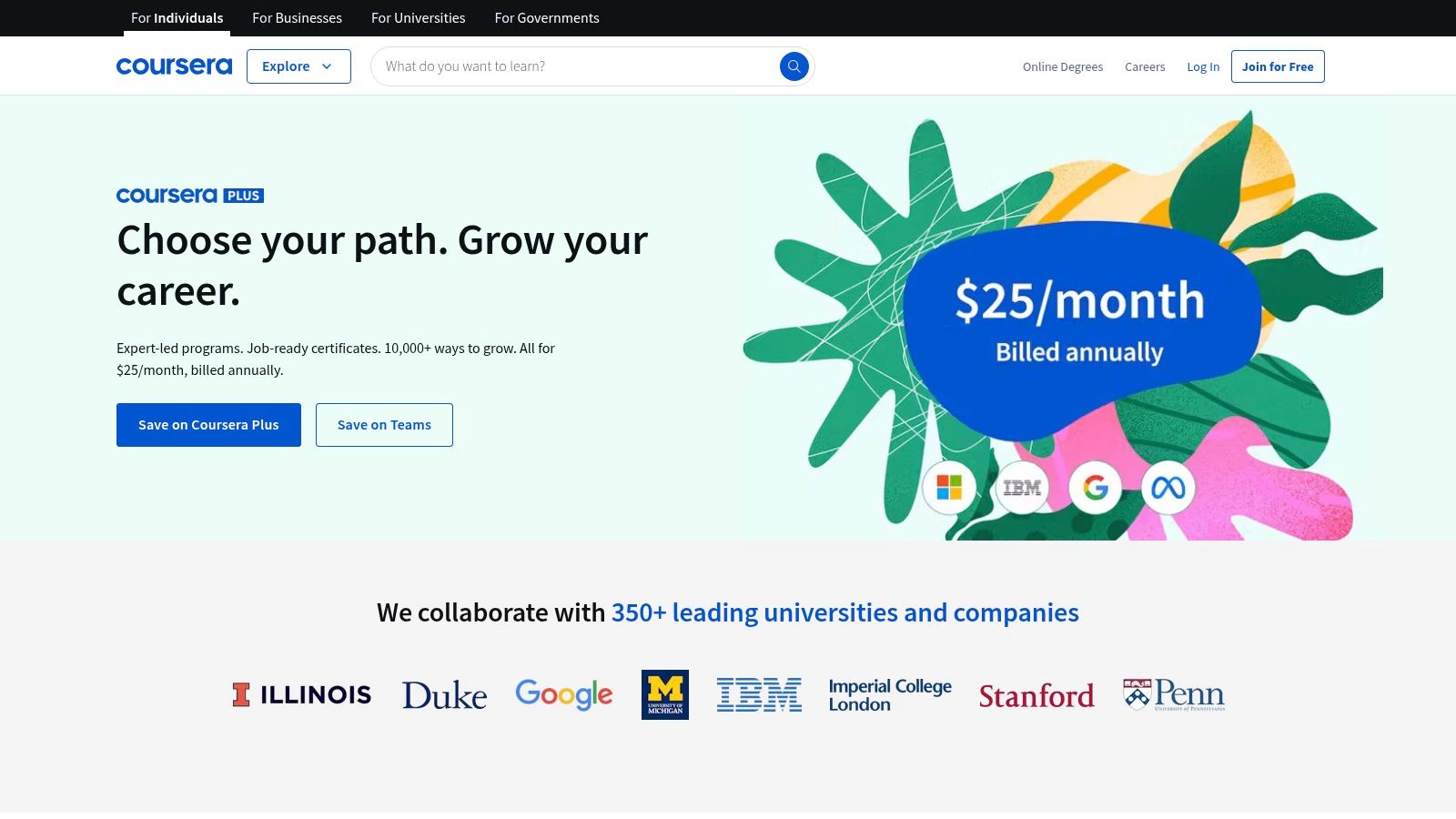
Coursera is a leading online education provider, partnering with respected universities and companies globally. The platform offers a wide variety of learning options, from individual courses to complete degree programs. This makes it a valuable tool for Shopify store owners and arts and crafts business owners alike, whether they're looking to improve existing skills or learn something entirely new.
For Shopify store owners, Coursera provides practical courses in areas such as e-commerce marketing, digital marketing analytics, business strategy, and financial accounting. These courses can give you the skills you need to optimize your online store, grow your customer base, and boost your profits. Imagine developing a stronger understanding of search engine optimization (SEO) or social media marketing through a specialized program taught by leading university experts – all from the convenience of your home.
Arts and crafts business owners can also find many beneficial courses on Coursera. Explore topics like graphic design, photography, art history, or even business management specifically designed for creative entrepreneurs. Improving skills in these areas can help you elevate your product photography, create more engaging marketing materials, and manage your business operations more effectively. If you're thinking about expanding your business by offering online workshops or tutorials, you might be interested in this resource: Creating Online Courses: Expert Tips for Success.
Key Features and Benefits
- University-Accredited Courses and Degrees: Earn credentials from recognized institutions.
- Specialization Tracks for In-Depth Learning: Focus on specific subjects with curated course sequences.
- Peer-Reviewed Assignments: Receive feedback from other learners and enhance your critical thinking.
- Financial Aid Options: Explore financial assistance to help you access paid courses and programs.
- Mobile Learning App: Learn anytime, anywhere, with the Coursera mobile app.
Pros and Cons of Using Coursera
Here's a quick breakdown of the advantages and disadvantages:
| Pros | Cons |
|---|---|
| High-quality content from top institutions | Most certificates and degrees are paid |
| Wide variety of subjects & specializations | Peer grading consistency can vary |
| Structured learning with credentials | Limited instructor interaction in some courses |
Website: https://www.coursera.org
Coursera offers a flexible and easy way to acquire valuable skills and knowledge applicable to both Shopify and arts and crafts businesses. While the cost of certificates and degrees is a consideration, the potential return on investment through improved business performance makes it a valuable option. Explore the many courses and specializations available to discover the ideal learning journey for you.
3. Udemy
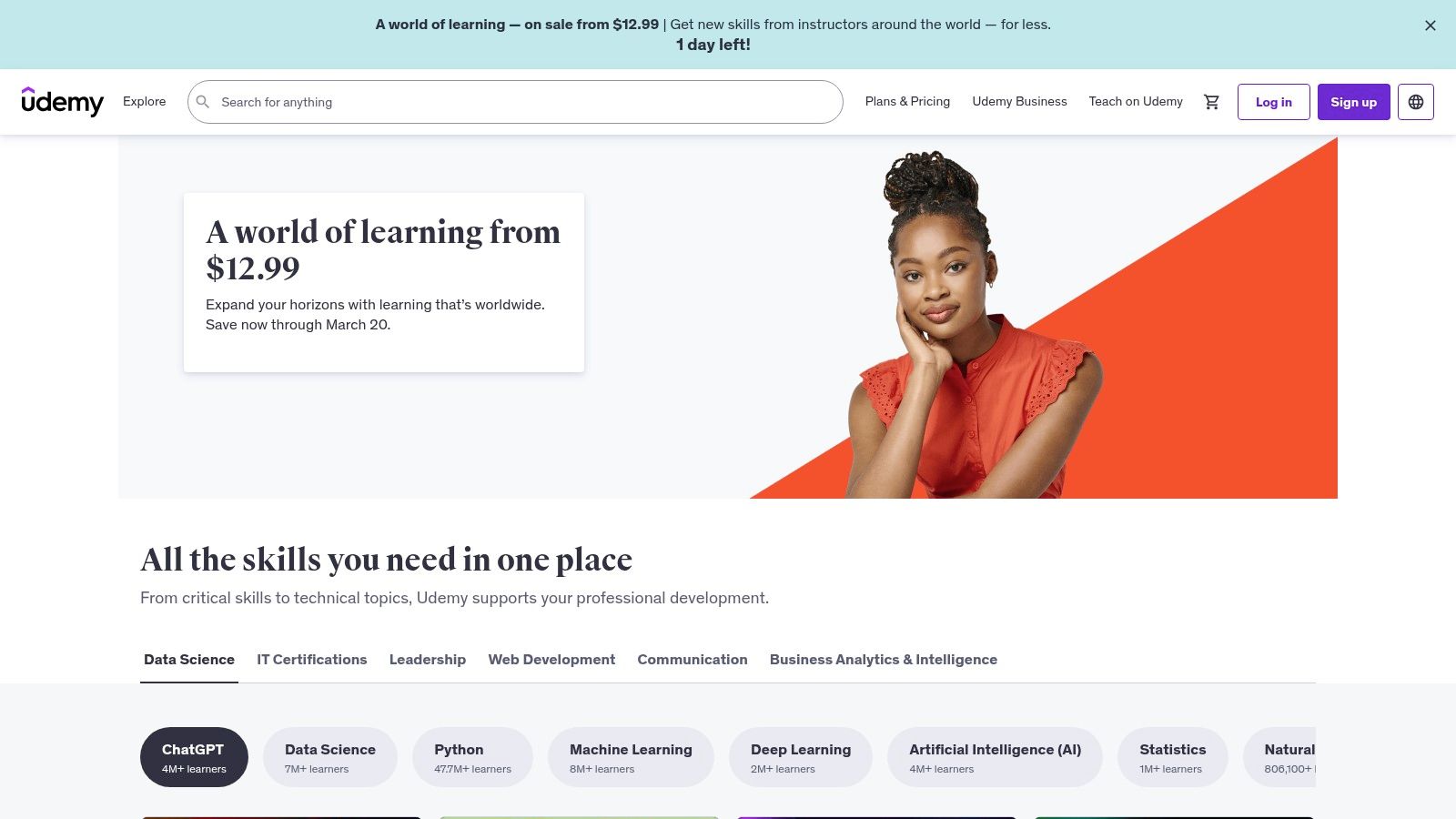
Udemy is a massive open online course marketplace, offering over 185,000 courses on a huge variety of topics. What sets Udemy apart is its unique approach: anyone can create and sell a course. This leads to an incredibly diverse library that you won't find on many traditional learning platforms. It's a fantastic resource for anyone looking to expand their skillset, especially Shopify store owners and arts and crafts business owners.
Why is Udemy on this list? Because its vast selection and flexible learning model cater to the diverse needs of online entrepreneurs.
For Shopify store owners, Udemy offers courses on everything from dropshipping and marketing to SEO and customer service, all directly applicable to boosting online sales. Arts and crafts business owners can find courses on specific crafting techniques, photography for product listings, social media marketing, and even financial management for small businesses. The self-paced learning allows busy entrepreneurs to learn on their own schedule.
Features and Benefits
-
Vast Course Selection: From technical skills and business to marketing, personal development, and even arts & crafts, Udemy has a course for nearly everyone.
-
One-Time Purchase Model: Unlike subscription-based platforms, you buy Udemy courses individually and have lifetime access. This allows you to revisit the material whenever you need a refresher, without paying recurring fees.
-
Instructor-Led Video Content: Courses are primarily video-based, often supplemented by practice exercises, quizzes, and downloadable resources.
-
Practical, Skill-Focused Content: Udemy focuses on practical skills and applying knowledge, making it ideal for those wanting to immediately implement what they've learned.
Pros
-
Affordable Prices & Frequent Sales: With frequent sales, Udemy courses are often available between $10-$20.
-
No Subscription Required: The one-time purchase model offers flexibility and saves money over time.
-
Immediate Access to All Course Materials: You get instant access to all course content upon purchase and can start learning right away.
Cons
-
Variable Quality of Courses: Because it's an open platform, course quality can vary. It's essential to check reviews and instructor ratings before buying.
-
No Formal Accreditation: Udemy courses generally don't offer formal accreditation or certifications recognized by academic institutions.
-
Limited Quality Control for Instructors: While Udemy has guidelines, the open platform makes it harder to maintain consistent instructor quality across the board.
Pricing, Technical Requirements and Setup Tips
Pricing: Individual course prices typically range from $10 to $200, with frequent sales offering significant discounts.
Technical Requirements: All you need is a computer, tablet, or smartphone with internet access. The Udemy mobile app also allows for offline learning.
Implementation/Setup Tips:
- Read reviews carefully: Check student feedback and the instructor's profile before you buy.
- Preview the course content: Many courses offer free preview lectures to give you an idea of the teaching style and content.
- Utilize the Q&A section: Engage with the instructor and other students in the Q&A section to get your questions answered and gain further insights.
Comparison with Similar Tools
Platforms like Skillshare and Coursera offer subscription-based models with curated content. Udemy’s vast selection and individual purchase model make it a flexible and cost-effective option if you want to acquire specific skills without a long-term commitment.
Website: https://www.udemy.com
4. edX

edX stands out for its high-quality, university-backed courses. These courses offer valuable skills for both Shopify store owners and arts and crafts business owners. While the platform leans towards academic subjects, it provides practical knowledge applicable to many business areas, including data analysis, marketing, and computer science.
For Shopify store owners, understanding customer behavior is key. edX offers data science courses that can help with this, along with optimizing pricing strategies and improving marketing campaigns. Courses in digital marketing and social media management can also boost your online presence and drive sales. And for those wanting to automate tasks or customize their websites with code, edX’s computer science courses can be a game-changer.
Arts and crafts business owners can also benefit from edX. Courses in design principles, photography, and business management are particularly relevant. While edX may not offer specific crafting courses, its business and marketing resources can provide a solid foundation for growth. Learning about accounting, financial planning, and marketing strategies can empower you to manage your business effectively and expand your reach.
Features and Benefits
-
University-created courses with academic rigor: Learn from leading experts at respected institutions like MIT and Harvard.
-
Verified certificates and credits: Earn official recognition to boost your resume and show your dedication to professional development.
-
Self-paced and instructor-led options: Choose the learning style that fits your schedule and preferences.
-
MicroMasters programs: Dive deep into a specific field and earn a valuable credential, potentially even as a stepping stone towards a master's degree.
-
Open-source platform technology: This contributes to the platform's innovation and accessibility.
Pricing
Most courses can be audited for free, letting you explore the content before committing. Verified certificates, which offer official recognition, typically range from $50 to $300 per course. MicroMasters programs and online degrees require a larger investment.
Technical Requirements
Accessing edX courses is simple. All you need is a reliable internet connection and a computer or mobile device. Certain courses might have specific software requirements, but these are typically readily available and free or inexpensive.
Comparison with Similar Tools
Compared to platforms like Skillshare or Coursera, edX offers a more academically rigorous experience. Skillshare focuses on creative skills, while Coursera offers a wider range of courses, many from industry partners. edX distinguishes itself with its university-level curriculum and potential for academic credit.
Implementation/Setup Tips
-
Browse the free courses to explore your interests and get a feel for the platform.
-
Consider your learning goals and budget when deciding between verified certificates and free auditing.
-
Take advantage of the self-paced learning options to fit coursework into your busy schedule.
Pros
- High academic standards
- Free auditing options
- Credentials applicable towards degrees
- Strong STEM and computer science offerings
Cons
- Less course variety than some competitors
- A more academic, less practical focus in certain areas
- Higher certificate prices than some platforms
Website: https://www.edx.org
5. LinkedIn Learning (Formerly Lynda.com)
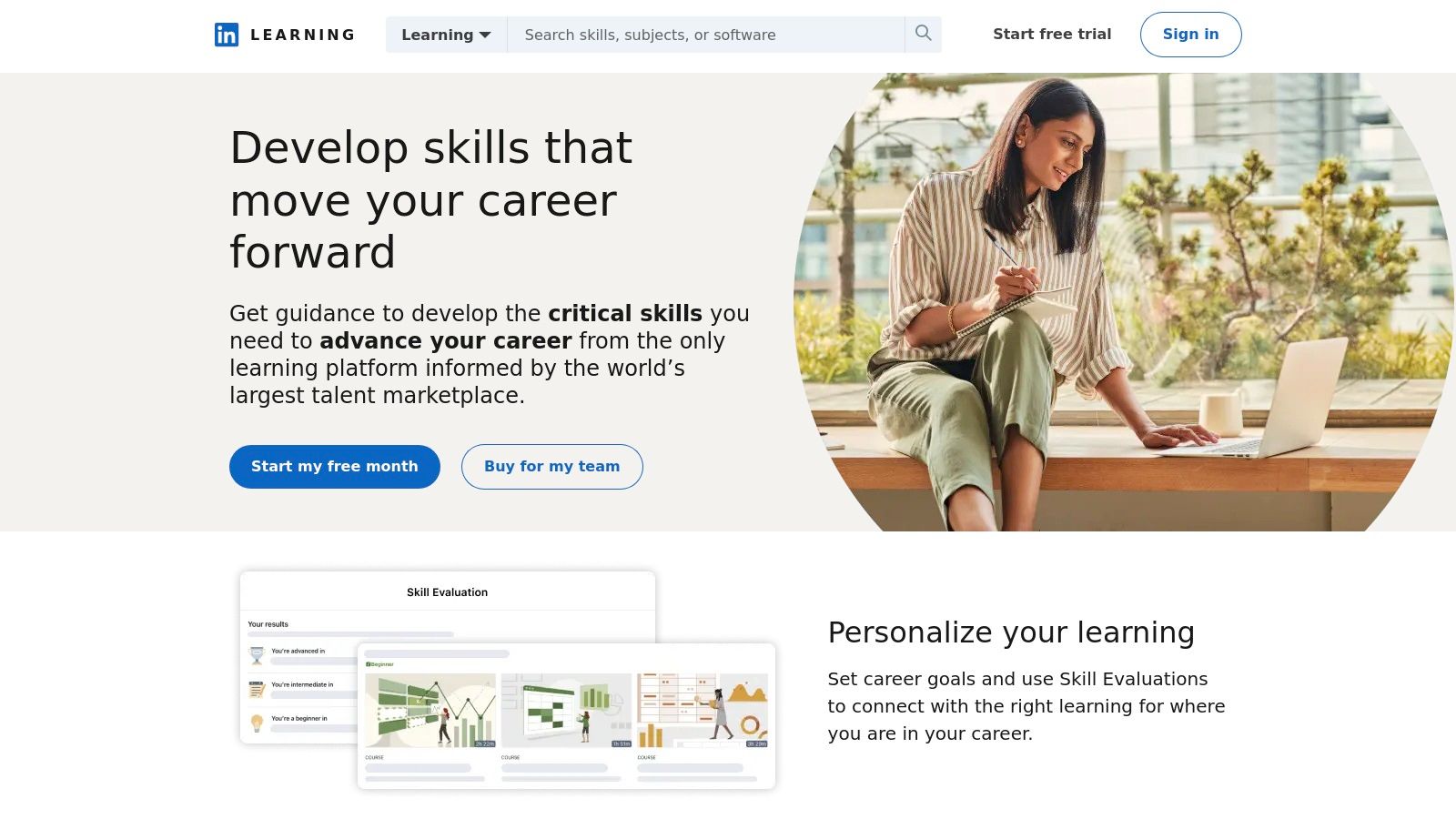
LinkedIn Learning is a robust platform brimming with over 16,000 expert-led courses. It focuses on professional development, making it a valuable asset for Shopify store owners and arts and crafts business owners. They can upskill in critical areas like marketing, sales, photography, and design software.
For Shopify owners, LinkedIn Learning offers a wealth of information in crucial areas like e-commerce marketing, SEO, social media marketing, data analytics, and project management. Imagine learning how to build a targeted Facebook ad campaign that boosts your store's visibility. Or picture optimizing your product listings for search engines using SEO techniques learned on the platform. These skills can directly translate into increased sales and business growth.
Arts and crafts business owners can also benefit significantly. Photography courses can elevate product imagery and branding. Instruction in software like Adobe Photoshop and Adobe Illustrator can enhance design capabilities and marketing materials. Learning about small business management, financial planning, or even video marketing can unlock new avenues for growth and success.
Features and Benefits
- Professional Skills-Focused Content: Courses are designed to give you practical skills you can immediately apply to your business.
- LinkedIn Profile Integration: Display completed courses and acquired skills on your LinkedIn profile to boost your professional credibility.
- Course Completion Certificates: Receive formal recognition of your new skills, further enhancing your professional profile.
- Personalized Course Recommendations: LinkedIn Learning suggests relevant courses based on your profile and interests.
- Mobile and Offline Viewing: Learn on the go and at your own pace, even without internet access.
- Skills Assessments and Learning Paths: Identify skill gaps and follow structured paths to acquire specific competencies.
Pros
- High-Quality, Professionally Produced Videos: Enjoy engaging and easy-to-follow instruction from industry experts.
- Targeted Toward Career Advancement: The focus is on practical skills that directly contribute to professional growth.
- Monthly Subscription Provides Access to the Full Library: Explore a wide range of topics and skills at your convenience.
Cons
- Less Academic Depth Than University-Partnered Platforms: The emphasis is on practical skills rather than in-depth theoretical knowledge.
- Subscription Cost May Be High for Casual Learners: Carefully consider the value proposition in relation to your learning goals.
- Limited Community Interaction: While LinkedIn provides a broader professional network, the learning platform itself offers less interaction.
Pricing and Technical Requirements
LinkedIn Learning offers a monthly subscription. Check the website for current pricing details. They often offer a free one-month trial. A stable internet connection is required for streaming courses. Mobile apps are available for iOS and Android devices for offline viewing.
Comparison With Similar Tools
Platforms like Skillshare and Udemy offer a greater variety of creative courses. However, LinkedIn Learning's focus on professional development and LinkedIn integration makes it a strong tool for career advancement.
Implementation/Setup Tips
- Start With a Free Trial: Explore the platform and identify relevant learning paths.
- Connect Your LinkedIn Profile: Showcase your accomplishments and build your professional brand.
- Dedicate Specific Time for Learning: Integrate learning into your weekly schedule for consistent progress.
- Focus on Skills Relevant to Your Business Goals: Prioritize learning that will directly impact your Shopify store or arts and crafts business.
LinkedIn Learning is a valuable resource for entrepreneurs seeking a competitive edge. By utilizing its extensive library, both Shopify and arts and crafts business owners can acquire the skills they need to thrive.
6. Pluralsight
Pluralsight is a leading online learning platform focused on technology, making it a valuable resource even for Shopify store owners and arts and crafts business owners venturing into the tech world. While its core strength is in software development, IT administration, and creative professional training, the platform offers skills surprisingly relevant to e-commerce entrepreneurs. With over 7,000 courses covering everything from web development and database management to cloud computing and cybersecurity, Pluralsight provides a robust learning environment for anyone looking to improve their technical skills.
Why is it on the list? While not specifically designed for e-commerce, Pluralsight offers valuable skills applicable to running an online business. Think about improving your site's SEO through technical optimization, understanding data analytics to inform marketing strategies, or even learning front-end web development to customize your Shopify theme. For crafts businesses exploring digital fabrication or 3D modeling for product design, Pluralsight's extensive software training can be transformative.
Features and Benefits
-
Technology Skill Assessments and Analytics: Figure out your current skill level and track your progress through personalized learning paths. This is especially helpful for identifying knowledge gaps in areas like SEO, data analysis, or specific software related to your business.
-
Hands-on Projects and Labs: Get practical experience through interactive projects and labs. You can apply your new skills in realistic scenarios, like building a basic website or implementing database queries for customer data analysis.
-
Role-Based Learning Paths: Follow structured learning paths designed for specific roles like front-end developer or data analyst. This allows you to gain a comprehensive skillset relevant to your business needs.
-
Offline Viewing: Download course content to learn on the go, perfect for busy entrepreneurs.
-
Interactive Courses with Coding Challenges: Test your knowledge with coding challenges and quizzes to solidify your understanding of technical concepts.
How Pluralsight Can Help
For Shopify Store Owners: Courses on SEO, web analytics, and basic front-end development can be particularly helpful for optimizing your online store and boosting its performance.
For Arts and Crafts Business Owners: If you're using digital tools in your work, courses on 3D modeling, graphic design software like Adobe Photoshop, or digital fabrication techniques can improve your creative process and product offerings.
Pros and Cons
Pros:
- Comprehensive Technology and Developer Content: A great resource for acquiring in-depth technical skills.
- Expert Instructors with Industry Experience: Learn from leading professionals in their fields.
- Skill IQ and Role IQ Measurement Tools: Track your skill development and demonstrate your expertise.
- Enterprise Team Management Features: Helpful for growing businesses to manage team training.
Cons:
- Limited Content Outside of Technology: Not suitable for learning non-technical business skills like marketing or finance.
- Higher Subscription Cost: Pricing plans vary, starting around $29/month for individuals. See their website for current pricing.
- Advanced Content May Be Challenging for Beginners: Some courses may require a basic level of technical knowledge.
Implementation/Setup Tips
- Determine your specific learning goals based on your business needs (e.g., improving SEO, understanding website analytics, learning specific software).
- Use Pluralsight’s skill assessments to determine your current skill level and areas for improvement.
- Select relevant learning paths or individual courses that align with your goals.
- Set aside dedicated time each week for learning and practice.
Comparison With Similar Tools
Platforms like Coursera and Udemy offer a wider range of subjects, but Pluralsight's strength is its in-depth focus on technology and developer-focused content. If you're looking to improve your technical skills, Pluralsight is an excellent option.
Website: https://www.pluralsight.com
7. Khan Academy
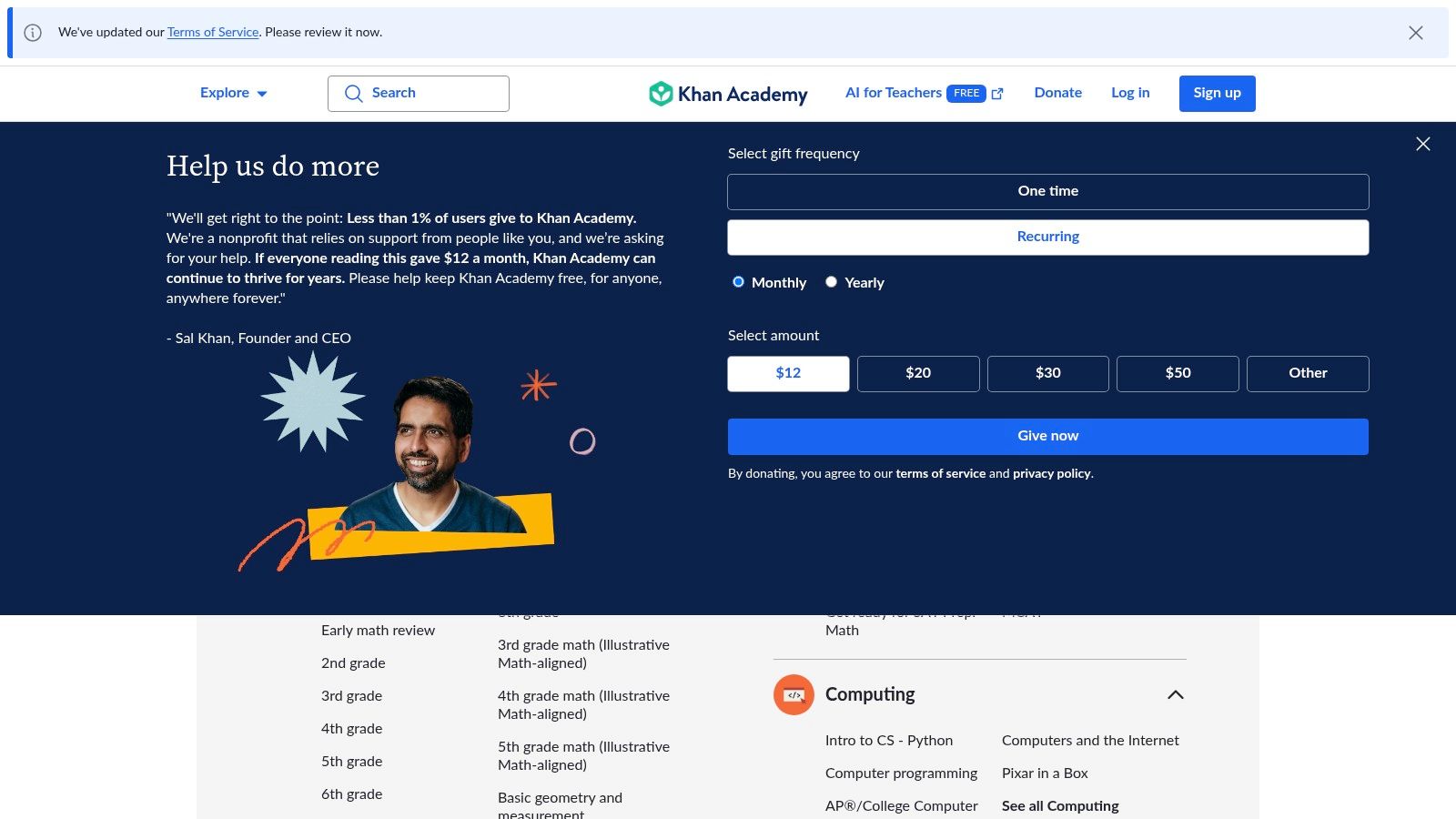
Khan Academy is a valuable resource for entrepreneurs seeking to bolster their foundational skills. While it may not offer specialized business courses, its comprehensive and entirely free educational content can be surprisingly relevant to various business owners, particularly those running Shopify stores or arts and crafts businesses.
For Shopify entrepreneurs, understanding data is key. Khan Academy provides practical courses in math, statistics, and economics, helping store owners analyze sales trends and grasp financial management principles. These skills are invaluable for understanding profit margins, interpreting sales data, and making data-driven decisions about pricing and inventory.
Arts and crafts business owners can also find applicable knowledge on Khan Academy. Courses in geometry and trigonometry can enhance design skills and assist with precise calculations for materials and dimensions. The platform's art history section offers valuable historical context and creative inspiration.
Features and Benefits
Khan Academy offers a range of features that make it a compelling learning platform for busy entrepreneurs:
- Completely Free: Access to all content is 100% free, removing financial barriers to learning.
- K-12 Curriculum Alignment: The structured, foundational approach to learning ensures a solid base for building more complex business skills.
- Mastery-Based Learning: Learners progress at their own pace, focusing on mastering individual concepts before moving on. This flexibility is perfect for entrepreneurs with limited time.
- Progress Tracking and Reports: Monitor your learning journey and identify areas for improvement. This feature allows for a focused and efficient learning experience.
- Interactive Exercises and Quizzes: Reinforce your understanding through practical application and identify knowledge gaps.
Pros and Cons
Like any resource, Khan Academy has its strengths and weaknesses:
Pros:
- No Cost: Enjoy completely free access to all features and content.
- Clear Explanations: The teaching style is known for its clarity and concise delivery.
- Structured Curriculum: The platform offers a logical learning progression.
- Parent/Teacher Dashboards: While designed for parents and teachers, these dashboards can also be utilized for self-monitoring or employee training.
Cons:
- Limited Advanced Topics: Khan Academy may lack specialized, advanced courses in business management or e-commerce.
- Production Quality: The video lessons may not have the high production value found on some paid platforms.
- No Formal Credentials: The platform doesn't offer formal certificates or accreditation.
Getting Started with Khan Academy
Website: https://www.khanacademy.org
Getting started with Khan Academy is simple. Create a free account, browse the subject areas, and select topics relevant to your business needs. The platform even offers personalized recommendations based on your learning progress. To make the most of Khan Academy, dedicate specific time slots each week to learning. Treat it as an investment in your business acumen. While it may not replace specialized business courses, it’s an excellent supplementary resource for strengthening essential skills and building a solid foundation for success.
8. Skillshare
Skillshare is a subscription-based online learning platform designed for creatives, entrepreneurs, and anyone looking to develop new skills through project-based learning. With a library of over 30,000 classes, Skillshare excels in areas like design, illustration, photography, writing, marketing, and business development. This makes it a valuable resource for Shopify store owners and arts and crafts businesses looking to sharpen their creative and business skills.
Instead of long, academic courses, Skillshare offers short, digestible classes taught by working professionals and industry experts. This format allows you to quickly gain practical skills you can apply to real-world situations. Think improving your product photography for your Shopify store, designing eye-catching marketing graphics, or creating engaging social media content. You might be interested in Boosting Creativity with Interactive Workshop Ideas for further inspiration. The platform's focus on project-based learning means you’ll actively create as you learn, building your portfolio and gaining valuable hands-on experience. For instance, an aspiring illustrator could take a character design class and immediately use their new skills to create unique product illustrations for their online shop.
Skillshare's Community Aspect
A key feature of Skillshare is its vibrant online community. After completing a class project, you can share your work and receive feedback from fellow students and instructors. This creates a collaborative learning environment where peer-to-peer interaction provides valuable insights and encourages continuous improvement. For Shopify store owners, this can be especially helpful for getting feedback on marketing materials or product designs directly from a target audience.
Features:
- Project-based learning: Learn by doing and completing practical projects directly related to your field.
- Creative community: Connect with other learners and get feedback on your work.
- Teacher-student interaction: Engage with instructors and receive personalized guidance.
- Short, focused classes: Quickly learn new skills without a major time commitment.
- Original content: Learn from working creators and industry professionals.
Pros:
- Focus on creative and artistic subjects: Perfect for visual learners and those in creative industries.
- Emphasis on practical projects: Gain hands-on experience and build a professional portfolio.
- Community feedback: Receive valuable insights and refine your skills.
- All-inclusive subscription: Access the entire class library for one price.
Cons:
- Less structured learning: May not be suitable for those seeking formal qualifications.
- Instructor quality can vary: While many instructors are excellent, the quality can differ between classes.
- Limited technical depth: The platform focuses more on practical application rather than in-depth theoretical knowledge.
Website: https://www.skillshare.com
Skillshare offers a variety of subscription plans, including free trials and premium options. The technical requirements are minimal, requiring only a stable internet connection and a compatible device (computer, tablet, or smartphone). Compared to platforms like Coursera or edX, which lean towards academic subjects, Skillshare prioritizes creative skills and practical application. This makes it a powerful tool for entrepreneurs and creatives looking to improve their skills and grow their businesses.
9. Udacity
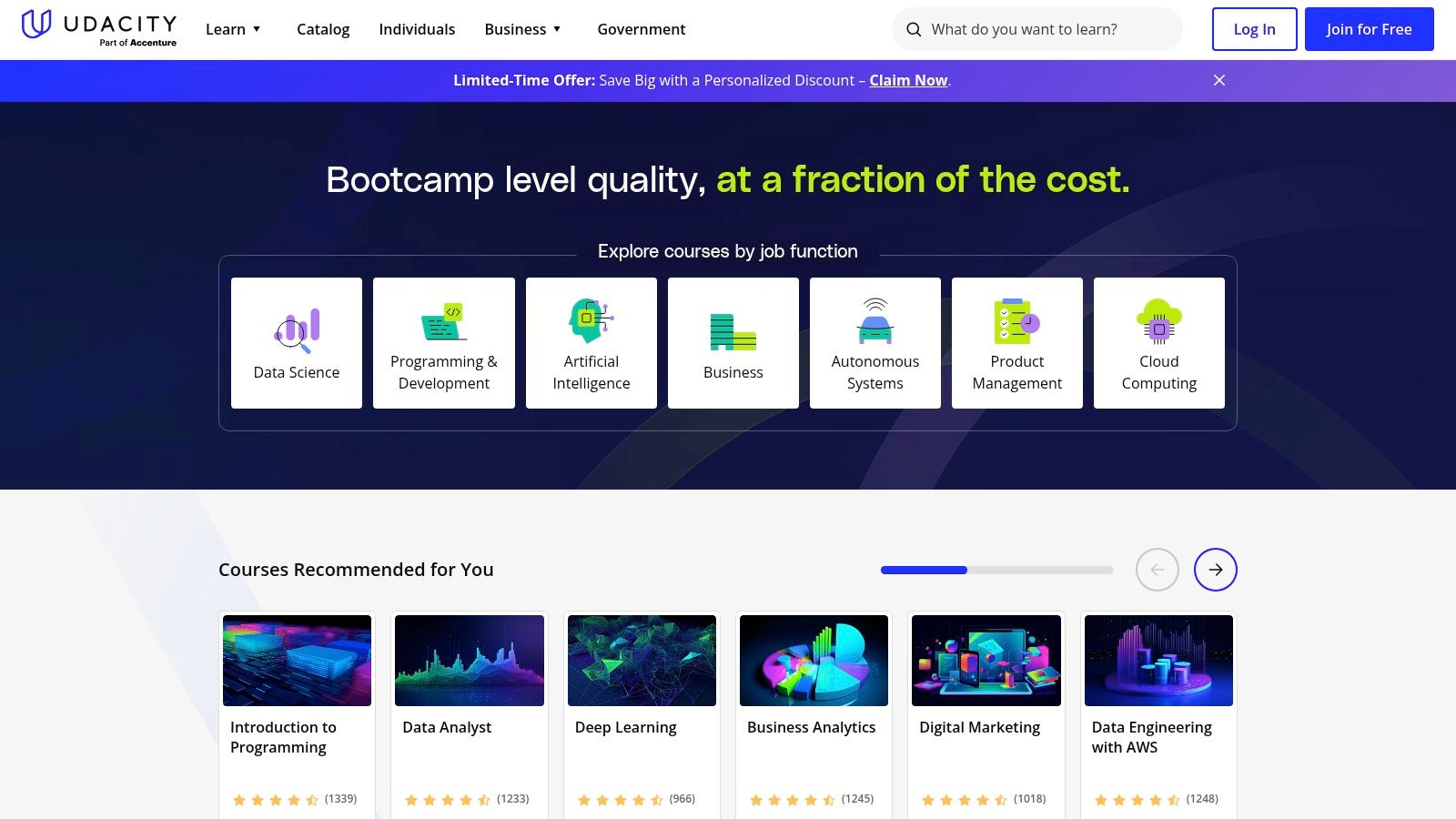
Udacity earns a place on this list thanks to its specialized and industry-focused tech training. While it may not be the perfect fit for everyone, especially those interested in arts and crafts, it presents compelling opportunities for Shopify store owners. Those looking to strengthen their technical skills and grow their businesses will find a lot to like. Consider it an investment in your future, giving you an advantage over the competition.
Udacity specializes in what it calls Nanodegree programs. These are intensive courses designed in collaboration with major companies like Google, Amazon, and Facebook. These programs zero in on in-demand tech fields, making them highly relevant for Shopify store owners looking to improve different aspects of their business.
Ways Shopify Owners Can Use Udacity
-
Boost Digital Marketing: Learn data analytics to better understand customer behavior. You can then implement SEO/SEM strategies more effectively and maximize your social media advertising.
-
Automate Store Operations: Dive into programming and learn to automate time-consuming tasks. Imagine automating inventory management, order fulfillment, or even certain customer service interactions.
-
Develop Custom Solutions: Imagine building custom Shopify apps tailored to your specific business needs. Or perhaps seamlessly integrating with other platforms crucial to your workflow. Udacity gives you the skills to make it happen.
-
Enhance Website Design and Functionality: Learn front-end web development to give your online store a facelift. Improve user experience and optimize for higher conversions.
Key Features of Udacity
-
Industry Partnerships: Nanodegree programs are co-created with leading companies, ensuring you learn practical, relevant skills needed in today's market.
-
Real-World Projects & Expert Review: Gain hands-on experience by working on real-world projects. Receive personalized feedback from experts to refine your skills and build your portfolio.
-
Technical Mentor Support: Benefit from one-on-one guidance and support from experienced professionals. Having a mentor can make all the difference in your learning journey.
-
Career Services & Coaching: While not directly applicable to all Shopify owners, these services can be helpful for those considering tech-related career transitions.
-
Content from Industry Leaders: Learn from the best in the field and gain access to the latest industry knowledge.
Pros and Cons of Udacity
Pros:
- Relevant Curriculum: Stay up-to-date with the latest technologies and best practices.
- Industry Recognition: Udacity Nanodegrees are highly respected within the tech industry.
- Personalized Feedback: Benefit from individual attention and accelerate your skill development.
- Job Placement Assistance: A potential added benefit for those seeking new career opportunities.
Cons:
- Cost: Nanodegrees represent a significant financial investment, potentially costing several hundred dollars per month depending on the program and payment plan.
- Narrow Focus: Udacity's concentration is primarily on technology-related subjects.
- Time Commitment: Nanodegrees require dedicated effort and consistent study.
Getting Started with Udacity
Begin by exploring the Nanodegree catalog and selecting programs that align with your business objectives. Consider the time commitment involved and ensure it fits with your schedule. Many programs offer free previews, allowing you to get a feel for the learning style and content before committing.
Comparing Udacity to Other Platforms
While platforms like Coursera and edX offer a wider range of subjects, Udacity distinguishes itself through its industry connections, personalized mentorship, and career services. If you're serious about acquiring in-demand tech skills to directly improve your Shopify store, Udacity is definitely worth exploring.
Website: https://www.udacity.com
10. FutureLearn

FutureLearn stands out due to its social learning emphasis and collaborations with leading universities and cultural institutions, both in Europe and globally. The platform offers a wide selection of learning opportunities, from individual courses and microcredentials to full online degrees. This makes it a valuable asset for personal growth and career advancement.
For those running Shopify stores or arts and crafts businesses, FutureLearn offers pertinent courses in key areas like marketing, business strategy, and design thinking. You can delve into subjects like boosting your online presence, understanding consumer behavior, and generating fresh product ideas.
FutureLearn’s course structure focuses on weekly modules with built-in discussions and learner interaction. This fosters a more engaging and collaborative learning environment compared to platforms that primarily use pre-recorded video lectures.
A Unique International Perspective
FutureLearn truly shines in the humanities, social sciences, healthcare, and business fields, offering a distinct international perspective. For instance, a Shopify store owner aiming to expand globally could learn valuable skills from courses on cross-cultural communication or international marketing tactics. Similarly, an artisan might find inspiration and skill development in courses covering art history, design principles, or particular craft techniques.
While FutureLearn provides flexible free access options, it's worth noting that this access is often time-restricted. For continued access to course materials and a certificate of completion, a paid subscription is required. Pricing varies depending on the specific course or program, so it's always best to check the individual course page for details. FutureLearn also offers microcredentials, which are shorter, targeted courses perfect for professional development, allowing you to upskill in specific areas related to your business. For more guidance, check out our article about Choosing the Right Platform for Your Online Course.
Technical Requirements and Accessibility
Technically, FutureLearn is accessible on any device with a web browser and a reliable internet connection. No special software is needed. The platform’s clean and intuitive interface makes navigating and engaging with the learning materials straightforward and user-friendly.
Features:
- Social learning methodology
- Short courses and full online degrees
- European and global university partners
- Structured weekly learning
- Microcredentials for professional development
Pros:
- Clean, intuitive user interface
- Diverse international perspective
- Discussion-oriented learning experience
- Flexible free access options
Cons:
- Smaller course catalog than major competitors (like Coursera or Udemy)
- Limited technical subject coverage
- Time-limited access to free course content
Website: https://www.futurelearn.com
FutureLearn earns its spot on this list by offering a unique social learning environment and access to a variety of high-quality courses from well-regarded institutions worldwide. While its course selection might not be as extensive as some larger platforms, its focused approach and emphasis on interaction make it a solid option for those looking for a more engaging and collaborative online learning journey.
Head-to-Head: Top 10 Online Learning Platforms
| Platform | Core Features ✨ | User Experience & Ratings ★ | Value & Pricing 💰 | Target Audience 👥 |
|---|---|---|---|---|
| 🏆 Tevello | Shopify integration, courses & communities, automated onboarding | ★★★★★ 5-star reviews, intuitive | $29/month flat rate Unlimited users & courses |
Shopify store owners, digital educators |
| Coursera | University-accredited courses, specializations | ★★★★☆ Prestigious content | Paid certificates & degrees | Global learners, professionals |
| Udemy | Vast course library, lifetime access | ★★★☆☆ Variable quality | Affordable, frequent sales | Casual learners, self-starters |
| edX | University courses, verified certificates | ★★★★☆ High academic rigor | Free auditing, fee for certificates | Academics, professionals |
| LinkedIn Learning | Career-focused, LinkedIn profile integration | ★★★★☆ Professionally produced | Subscription-based | Career advancers, professionals |
| Pluralsight | Tech skills, role-based paths, interactive labs | ★★★★☆ Expert-led content | Premium subscription | Tech professionals, developers |
| Khan Academy | Free K-12 curriculum, mastery-based learning | ★★★★☆ Simple & effective | Completely free | Students, educators |
| Skillshare | Creative projects, community feedback | ★★★★☆ Engaging & creative | Subscription-based | Creatives, hobbyists |
| Udacity | Nanodegree programs, industry partnerships | ★★★★☆ Project-based learning | Higher price point | Tech enthusiasts, career switchers |
| FutureLearn | Social learning, microcredentials | ★★★★☆ Intuitive UI | Freemium options | Global learners, professionals |
Ready to Embark on Your Learning Adventure?
With this overview of the top 10 online learning platforms, you’re well-equipped to choose the perfect one to suit your learning style, goals, and budget. When making your decision, consider factors like the platform's specific course offerings, its pricing structure (free, subscription, or per-course), the level of interactivity and community features, and its compatibility with your existing tools.
For example, if you’re focused on technical skills, platforms like Pluralsight or Udacity might be a good fit. If you’re interested in broader topics or creative pursuits, platforms like Skillshare or Coursera offer a wider range.
Getting started is usually straightforward. Most platforms allow you to create a free account to browse courses and explore their features. Before committing to a paid plan, take advantage of free trials or introductory offers to ensure the platform meets your needs. Think about your budget and how much you’re willing to invest in your online learning journey.
Some platforms offer individual courses for a one-time fee, while others operate on a subscription model. Finally, consider integration and compatibility. If you’re a Shopify store owner, look for platforms that integrate seamlessly with your existing setup. This can simplify administrative tasks and create a cohesive learning experience.
Key Takeaways for Choosing a Platform
Here are some key takeaways to remember when choosing an online learning platform:
- Content Relevance: Does the platform offer courses that align with your learning objectives?
- Pricing Model: Evaluate various pricing structures (free, subscription, per course) to find what works best for your budget.
- Interactivity & Community: How important is interaction? Consider the community features available, especially if you enjoy collaborative learning.
- Integration & Compatibility: For Shopify store owners, seamless integration with your existing store is vital for streamlined operations.
Whether you’re diving into a new skill, boosting your career prospects, or simply exploring a passion, the world of online learning awaits. Start your learning journey today!
Want to Sell Courses on Your Shopify Store?
Want to seamlessly integrate online courses and communities directly into your Shopify store? Tevello empowers you to offer digital products and courses without sending customers to a separate site.
Streamline your operations and enhance user experience with customizable learning paths and interactive workshops. Increase your selling potential through upselling and cross-selling opportunities with integrated course enrollment. Tevello also offers multilingual functionality, robust video hosting, and dedicated support. Transform your Shopify store into a comprehensive learning hub and elevate your business with Tevello. Learn more at Tevello.




